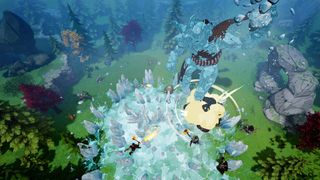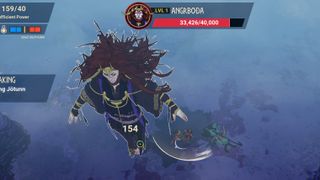If you play Tribes of Midgard solo, prepare to get stomped
But if you keep trying, things will get easier, and there's a survival mode with a more relaxed pace.

If you're thinking of playing Tribes of Midgard solo, prepare for an extremely challenging experience—especially for your first several runs. The co-op Viking ARPG is a hectic session-based game with a blisteringly fast pace and a dozen different things to do at any given moment. And when you're trying to do all those things solo, it can be downright overwhelming.
In Tribes of Midgard, players need to scour the procedural world for crafting materials, and travel further and further out to complete quests, battle monsters, and find rare resources. But they also need to build up their bases defenses for nightly attacks by demonic creatures called Helthings (presumed translation: things from hell) which means spending plenty of time back at base. Giant bosses spawn at the edges of the world and stalk toward your base, and need to be destroyed before they get too close, which means tracking them down and fighting them in the wild. But players can only craft weapons and potions back at their village, so those boss fights can take several in-game days to win, with multiple trips back to base to freshen up and re-equip (and continue to defend against the Helthing mobs).
This means there's a lot of dashing back and forth across the world in Tribes of Midgard. The game pulls you in different directions from the moment you start a session until the very end. With ten players it's a frantic, incredibly busy experience. Playing alone, it can feel ten times as hectic.
It's built for co-op play
I've split my time in Tribes of Midgard so far pretty evenly between co-op and singleplayer, with about eight hours spent in each. And while you can play it solo, it is more of a co-op experience. It's right there in the title: you're meant to be part of a tribe.
Just having a few co-op partners around means dividing and conquering. Four players can head in four different directions to uncover huge swaths of the map at the same time. During nightly Helthing attacks on the village, some players can mind the store while others continue exploring and gathering resources that are more plentiful at night. Playing solo means you need to defend your base personally almost every night (NPC villagers can handle things for a while, but Helthings grow stronger with each passing day) which can pull you away from fruitful gathering excursions.
When a giant spawns in co-op, one player can go find it and begin chipping away at its massive health meter while others keep gathering resources or craft weapons that will be most useful against the boss. Different projects, like upgrading base defenses or building farms and quarries can be handled at the same time. Teamwork makes the dreamwork: it isn't just a rhyme, it really feels essential to progressing in Tribes of Midgard. (Not that I've beaten the boss in Saga Mode, yet, even with teammates. But I've gotten much closer than I have alone.) Trying to juggle it all alone in Saga mode feels just about impossible.
Monsters are easier solo, but everything else is harder
Attention has definitely been paid to solo mode: Difficulty is scaled, so co-op players will find monsters and giants much harder to defeat, with difficulty vastly increasing the more people are playing. Winning battles in solo mode can be challenging, but it's noticeably easier than in co-op. Playing on my own, I defeated three towering giants in the same session without them ever reaching my village borders. Same with the nightly attacks from Helthings: The monsters are far less deadly while playing solo (though they get harder the longer you survive).
The biggest gaming news, reviews and hardware deals
Keep up to date with the most important stories and the best deals, as picked by the PC Gamer team.
The issue playing solo isn't the difficulty of the monsters, it's all the other stuff. There's just so much to manage: exploring, resource gathering, building defenses, leveling up village NPCs, completing quests, unlocking fast-travel shrines, and building projects out in the wild. You can kill monsters by yourself, but there's simply not enough time to get everything else done, so you need to focus on a few tasks and forget the rest. One Viking can't be in five places at once. Even the nightly attacks grow into a real a problem, not because the monsters are that hard to kill but because they charge in from three different village entrances and one player can't guard those entrances at the same time.
But even if succeeding in Saga mode seems impossible solo, it does get easier the more you play. You'll get better at prioritizing tasks and spending resources where they can help the most. Plus you can gain XP and make progress with your character even on badly failed runs, and rewards also mean starting your next game with weapons or tools so you don't have to begin from scratch, which will make things a touch easier. And if you're a solo player, you should play Saga mode long enough to try out survival mode.
Survival mode is better for solo players
Survival mode is unlocked once your character has reached level 3, which should only take a few runs on Saga mode. In survival mode the pace is a bit more relaxed, it's not quite as hectic, and there's more time to get things like base improvements and map exploration done.
Unlike Saga mode, which will eventually progress to an eternal winter where the world freezes and the Helthings never stop attacking your village, Survival mode is essentially an 'endless' mode. Theoretically, you could play forever, though it grows more difficult the longer you've played. Winter will still arrive, but it'll eventually cycle back into summer. I've done a lot better in survival mode than in Saga, and managed to complete a number of village defense projects I couldn't get close to completing in Saga mode.

Customize survival mode to fit your skill
Survival mode is also customizable. You can change a lot of the game's parameters—choose the map size, adjust the difficulty level of the creatures, giants, and invading Helthings, and even dictate what resources you lose upon death. Making things easier means gaining less XP, but if you're looking for a less overwhelming solo experience, it's nice to have the option to turn down the death a little.
I don't think Tribes of Midgard is great as a solo game, unlike something like Valheim, which can be also brutally tough on solo players—although at least you control the pace of the game and there's plenty of downtime to complete projects. But if you're going to tackle Tribes of Midgard alone, I'd recommend only playing Saga mode until you're level 3, and then moving over to Survival mode for a while. It's no walk in the park, but it's not quite as brutal and desperately hectic an experience as Saga mode is on lone Vikings.

Chris started playing PC games in the 1980s, started writing about them in the early 2000s, and (finally) started getting paid to write about them in the late 2000s. Following a few years as a regular freelancer, PC Gamer hired him in 2014, probably so he'd stop emailing them asking for more work. Chris has a love-hate relationship with survival games and an unhealthy fascination with the inner lives of NPCs. He's also a fan of offbeat simulation games, mods, and ignoring storylines in RPGs so he can make up his own.
Most Popular

